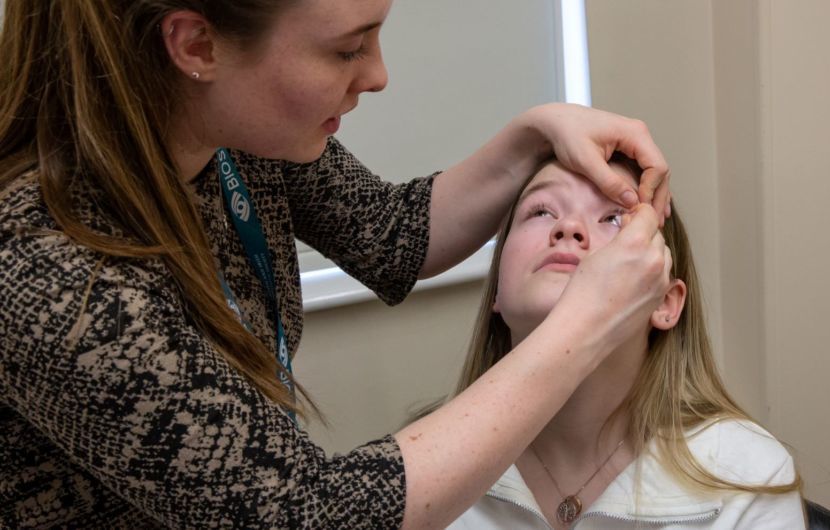#PrescribingNow
BIOS believes that full independent prescribing responsibilities are needed to maximise the impact of orthoptists working in advanced roles throughout ophthalmology. This has the potential to provide more timely care for patients as well as enabling orthoptists to better support overstretched eye health services.
The #PrescribingNow campaign is calling on the UK Government to use the powers it has under the Medicines and Medical Devices Act (2021) to extend independent prescribing responsibilities to dietitians, occupational therapists, orthoptists, diagnostic radiographers, and speech and language therapists where it is safe and appropriate to do so within the scope of their professional practice.
The campaign is a partnership between the British Dietetic Association, the Royal College of Occupational Therapists, the Royal College of Speech and Language Therapists, the Society of Radiographers, and BIOS.
It builds on the collective work these organisations did during the passage through Parliament of the Medicines and Medical Devices Act when MPs and peers advocated for us to be granted prescribing responsibilities.
The #PrescribingNow campaign is supported by the British Association of Prosthetists and Orthotists as prosthetists and orthotists will be seeking independent prescribing responsibilities in the future.
How can you get involved?
As an orthoptist, your voice is important, and there’s plenty you can do to spread the message and make sure we’re heard by Government:
- You can send a letter to your local MP asking them to support our letter to the Secretary of State for Health and Social Care. The Royal College of Speech & Language Therapists are hosting an e-action to help you contact your MP. Remember, the more personalised your email,m the more your MP is likely to take action: our template letter includes examples of the types of examples you could include.
- You can get involved on social media, using our campaign hashtag #PrescribingNow and our graphic, to show your support for independent prescribing responsibilities for orthoptists. Liking and retweeting our, and our fellow AHPs, social media posts on this campaign goes a long way to show the Department for Health and Social Care that this is a campaign that our members and the profession care about.
If you are another healthcare professional who supports our call, you can also use the material above – tailor the letter to your MP by highlighting why you support us being granted independent prescribing responsibilities and why it would help you.
Why is Independent Prescribing important?
Orthoptists are currently able to supply and administer certain medicines under exemptions. This is approved for all undergraduate and post graduate courses to enable qualified orthoptists to be annotated on the HCPC register.
Orthoptists are currently the only regulated professionals in the ophthalmology workforce unable to independently prescribe. IP would help to address the capacity and demand issues in ophthalmology and provide benefit to patients.
Orthoptists are already working in advanced and extended role practice and have done so for many years, they have contributed significantly to the development of the Ophthalmology Common Competency Curriculum and framework (OCCCF) and are training as both clinical and educational supervisors for other professionals gaining certificates through the OCCCF programme.
Orthoptists assess, diagnose and manage a wide range of patients in many of the ophthalmology sub-specialities, such as paediatric ophthalmology, neuro ophthalmology, oculoplastics, cataract, glaucoma, emergency, medical retina and vitreo- retinal, and low vision. Orthoptists are heavily involved in assessing and managing the visual complications that arise from medical patients as part of the stroke pathway, those with neurological or endocrine impairment or patients who are frail or at risk from falls.
We believe that there are both benefits to patients and to the profession if Orthoptists were Independent Prescribers and we have case studies and evidence to support the case and some are listed below.
Benefits to patients
- Reduce risk of sight loss and visual progression in the disease process (IIH, corneal exposure in stroke or Thyroid patients)
- Increase recovery of visual symptoms in neuro conditions (MS)
- Early detection of subtle visual changes and early management is more effective (glaucoma)
- Early treatment following detection of advancement of disease (glaucoma, IIH, Pituitary tumour)
- Flexibility and responsive management for those with LD and in Special schools to adapt to required diagnostic and management pathways.
- Reduce the heavy reliance on asking the GP to prescribe which occurs in some ocular pathways to address the lack of prescribing rights for orthoptists
- Increase the available workforce in ophthalmology pressure areas (EED, glaucoma, neuro ophthalmology, paed ophthalmology)
- Orthoptists already provide some aspects of counselling and psychological support and signposting in patients with active disease – IP would enable the medical management without need for additional appointments for vulnerable patients
- Orthoptists can act as both diagnostic / monitoring and therapeutic practitioners – IP would enable the patient pathway to be delivered in a consistent and co ordinated manner building relationships with patients and trust in practitioner
- Improved patient experience as both new and FU wait times would be reduced in a risk stratified group of patients
- Waiting time during clinic would be reduced (orthoptists would not have to find a prescriber to change treatment)
- Reduced follow up appointments required to book into a prescriber led clinic
- Increased capacity as more patients could be seen per clinic
- Increased choice of access to clinics (evening and weekends)
Benefits to the orthoptic profession
- Provide equity in career framework and progression with other eye health professionals
- Improved clinician experience in ability to run extended clinics more independently
- Reduced bias when recruiting non-medical practitioners for extended roles in ophthalmology (nursing and optometry professions can become IPs)
- Increase recruitment into the profession
- Further contributions possible to the OCCCF, GIRFT, LTP

